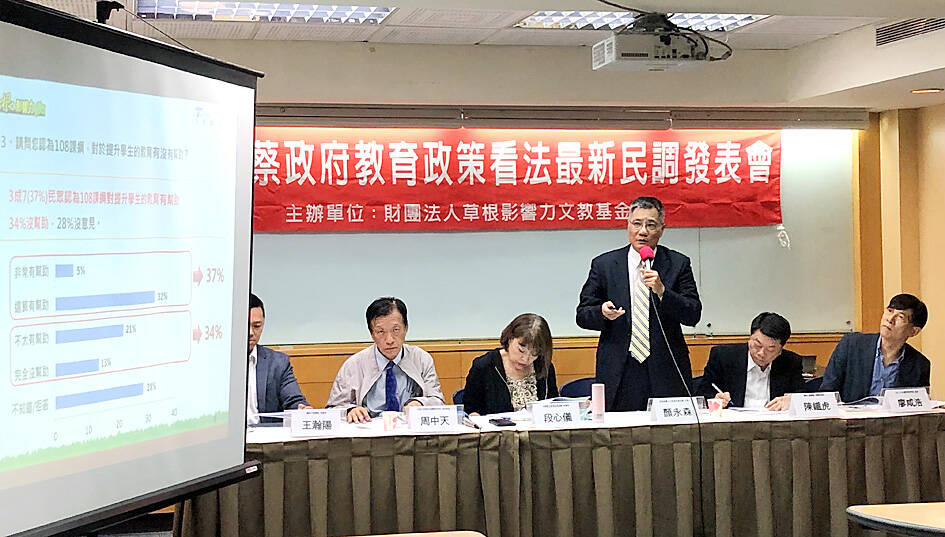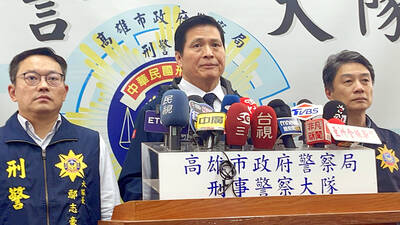The bid to turn Taiwan bilingual by 2030 could backfire and widen the English-language capability gap among students, telephone poll results showed on Friday.
The Grassroots Influence Foundation, which periodically conducts polls to determine public opinion on key government policies, said a majority of respondents expressed concern about the government’s Bilingual Nation 2030 campaign.
Sixty-two percent of the 1,111 respondents agreed when asked if they were worried the policy could lead to an “M-shaped” distribution with extreme high-performing and low-performing students in English, the foundation said.

Photo: Rachel Lin, Taipei Times
Twenty-nine percent rejected the premise, while 11 percent expressed no opinion in the survey conducted from May 29 to June 2, it said.
Under the government’s plan, schools in Taiwan at all levels are encouraged to expand English-language courses and programs.
The government has pledged to introduce English services in public facilities, as well as create an English-friendly environment nationwide.
However, 64 percent of respondents agreed that an increase in English-based courses is likely to make it more difficult for students to learn, and it could create more stress, the foundation said at a news conference.
English has been given an excessively high weighting in student’s studies, said Liao Hsien-hao (廖咸浩), dean of the Institute for Advanced Studies in the Humanities and Social Sciences at National Taiwan University.
Advances in translation technologies have effectively made the bilingual nation policy redundant, Liao said, adding that students should devote less time to learning foreign languages.
The survey, which targeted individuals aged 18 or older, had a margin of error of 2.9 percentage points.
A petition on the government’s Public Policy Online Participation Network Platform calling for the bilingual policy to be dropped received more than 10,000 signatures — double the threshold required for a formal response — within one week of posting on April 7.
The government has said it would officially respond to the petition on July 14.

Twenty-four Republican members of the US House of Representatives yesterday introduced a concurrent resolution calling on the US government to abolish the “one China” policy and restore formal diplomatic relations with Taiwan. Led by US representatives Tom Tiffany and Scott Perry, the resolution calls for not only re-establishing formal relations, but also urges the US Trade Representative to negotiate a free-trade agreement (FTA) with Taiwan and for US officials to advocate for Taiwan’s full membership in the UN and other international organizations. In a news release announcing the resolution, Tiffany, who represents a Wisconsin district, called the “one China” policy “outdated, counterproductive

Actress Barbie Hsu (徐熙媛) has “returned home” to Taiwan, and there are no plans to hold a funeral for the TV star who died in Japan from influenza- induced pneumonia, her family said in a statement Wednesday night. The statement was released after local media outlets reported that Barbie Hsu’s ashes were brought back Taiwan on board a private jet, which arrived at Taipei Songshan Airport around 3 p.m. on Wednesday. To the reporters waiting at the airport, the statement issued by the family read “[we] appreciate friends working in the media for waiting in the cold weather.” “She has safely returned home.

ON PAROLE: The 73-year-old suspect has a criminal record of rape committed when he was serving in the military, as well as robbery and theft, police said The Kaohsiung District Court yesterday approved the detention of a 73-year-old man for allegedly murdering three women. The suspect, surnamed Chang (張), was arrested on Wednesday evening in connection with the death of a 71-year-old woman surnamed Chao (趙). The Kaohsiung City Police Department yesterday also unveiled the identities of two other possible victims in the serial killing case, a 75-year-old woman surnamed Huang (黃), the suspect’s sister-in-law, and a 75-year-old woman surnamed Chang (張), who is not related to the suspect. The case came to light when Chao disappeared after taking the suspect back to his residence on Sunday. Police, upon reviewing CCTV

Johanne Liou (劉喬安), a Taiwanese woman who shot to unwanted fame during the Sunflower movement protests in 2014, was arrested in Boston last month amid US President Donald Trump’s crackdown on illegal immigrants, the Criminal Investigation Bureau (CIB) said yesterday. The arrest of Liou was first made public on the official Web site of US Immigration and Customs Enforcement (ICE) on Tuesday. ICE said Liou was apprehended for overstaying her visa. The Boston Field Office’s Enforcement and Removal Operations (ERO) had arrested Liou, a “fugitive, criminal alien wanted for embezzlement, fraud and drug crimes in Taiwan,” ICE said. Liou was taken into custody